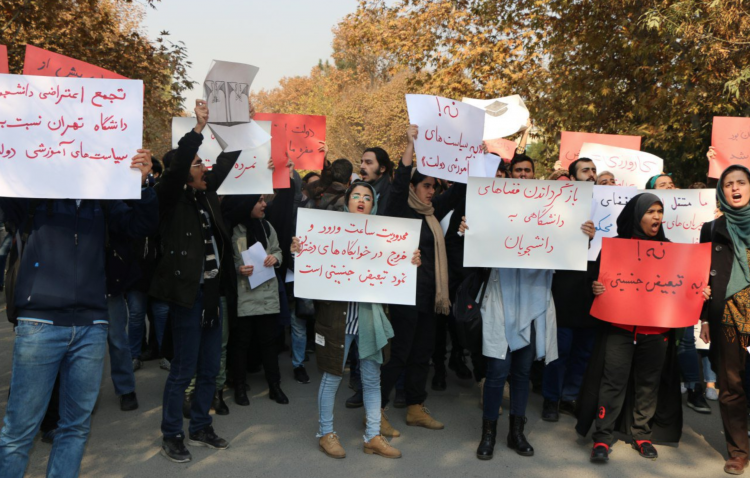CHRI – Protests were held at several Iranian universities on December 7, 2017, on the occasion of Student Day. One activist told the Center for Human Rights in Iran (CHRI) that President Hassan Rouhani has failed to uphold his election campaign promise to end the securitization of university campuses.
 “On the eve of this year’s Student Day, students were summoned over the phone and warned not to take part in protests,” student activist Mohammad Sharifi Moghaddam told CHRI. “The authorities have made it more difficult to organize unions to seek better living conditions for students. The climate for political activities now is even worse than before.”
“On the eve of this year’s Student Day, students were summoned over the phone and warned not to take part in protests,” student activist Mohammad Sharifi Moghaddam told CHRI. “The authorities have made it more difficult to organize unions to seek better living conditions for students. The climate for political activities now is even worse than before.”
Student Day marks the anniversary of the death of three students who were killed by the shah’s military at the University of Tehran on December 6, 1956, while protesting against the British and US-backed coup against Iran’s popularly elected prime minister, Mohammad Mossadegh.
After Iran’s 1979 revolution, officials tried to use Student Day to boost the image of the Islamic Republic, but the pro-revolution propaganda has been increasingly drowned out by calls for reform.
This year the protests focused on the rising costs of higher education, gender, and religious discrimination, and the ongoing presence of security forces on campuses.
“In recent years the demands of the student movement have shifted to economic issues, which society as a whole is grappling with,” said Moghaddam.
The protests began on December 4 at the University of Tehran and spread to other campuses in the capital, including the Sharif University of Technology, Allameh Tabataba’i University, and Shahid Beheshti University. Students also held rallies in other cities including at Neyshabur University in northeastern Iran.
The protests were primarily organized by a confederation of more than 30 student union groups that issued a joint statement calling for an end to the privatization of student services; the reinstatement of state subsidies for students on food, housing, and transportation; the reinstatement of independent student groups and students who were expelled for political reasons; ending gender discrimination on campuses; and allowing ethnic and religious minorities to pursue higher education in Iran.
“The onslaught of the government’s neo-liberal policies and privatization has sharply increased students’ cost of living and diminished the concept of free education,” Moghaddam told CHRI.
“Students are protesting because everything from the cost of food to dormitory accommodations and tuition is making it very difficult to continue pursuing education,” he said.
The increasing presence of security forces at universities was another major issue raised this Student Day.
During a speech at Sistan and Baluchistan University in the provincial capital of Zahedan on December 3, President Rouhani boasted that campuses were no longer shrouded by the harsh security climate that was implemented during President Mahmoud Ahmadinejad’s terms (2005-2013).
“One of the efforts made by the government in the past four years was to allow students to flourish, and if you compare that to the previous eight years, you can clearly see that today university students can express themselves with a strong voice without stammering,” said Rouhani.
However, Moghaddam pointed out to CHRI that the Science Ministry, which operates under Rouhani and oversees university affairs, does not allow the formation of independent student organizations, and protesters are often summoned to disciplinary and security agencies for engaging in peaceful activism.
“The security climate in the universities has become more difficult and increased the cost of resistance,” he said. “If students protest and try to change the situation, they will be called to answer to the disciplinary committees.”
At an earlier rally by female students at the University of Tehran on November 27 that lasted three days, students demonstrated against gender discrimination, excessive enforcement of the hijab, and the rising costs of student housing.
“Like other sectors of society, universities treat women in a patriarchal fashion so much so that the hijab has been made mandatory even inside the female dorms, and the students feel they have less freedom because they have to be inside by 8:30 p.m. or else their families will be contacted,” said Moghaddam.
In a joint statement, 32 student union organizations said they had given up on asking politicians to listen to their demands.
“The student movement is alive because its slogans are rooted in bitter experiences that are easy to see,” said the statement. “Instead of asking for help from political factions, we seek solidarity with workers and teachers to demand the rights denied to all of us.”
 Shabtabnews In this dark night, I have lost my way – Arise from a corner, oh you the star of guidance.
Shabtabnews In this dark night, I have lost my way – Arise from a corner, oh you the star of guidance.


